⚡ZurzAI.com⚡
Companies Similar to Dataloop
Datavolo
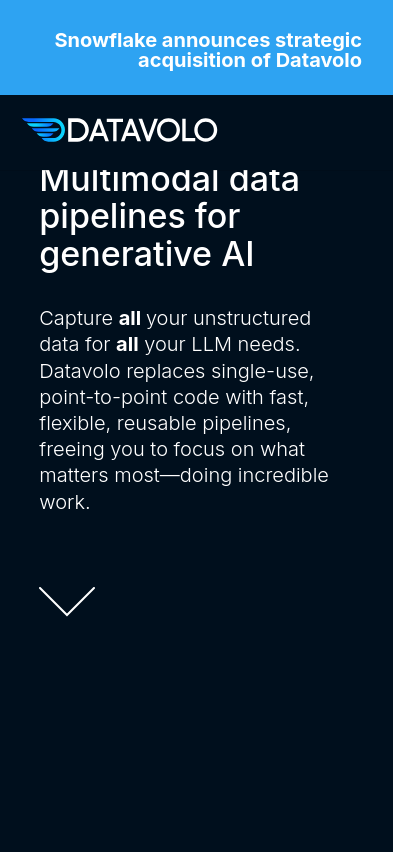
Snowflake acquires Datavolo to enhance dataflow infrastructure for generative AI, enabling efficient data pipeline creation, customizable configurations, and improved data trustworthiness.
Datavolo focuses on developing dataflow infrastructure, specifically targeting organizations looking to optimize their use of multimodal data pipelines for generative AI applications. They position themselves as a solution for capturing and processing unstructured data, which is essential for Large Language Models (LLMs) in AI.
Key Focus Area:
- Datavolo specializes in creating flexible, reusable data pipelines designed to handle unstructured data efficiently, allowing clients to derive more value from their AI applications.
Unique Value Proposition and Strategic Advantage:
-
Datavolo's unique value proposition lies in their capability to simplify data infrastructure through the use of "infrastructure-as-visuals." This means the platform allows for intuitive, visual-based data management processes. Unlike traditional setups, which require extensive custom coding, Datavolo provides instant configurability and scalability.
Strategic advantages include:
- Speed and Flexibility: The pipelines can be configured quickly and adapted to changing needs without rewriting code. This is particularly useful for businesses that need to manage different data demands dynamically.
- Observability and Transparency: Data lineage is integrated into every pipeline, providing clients with a clear view of where each piece of data originated and how it is processed, which is crucial for compliance and operational insights.
- Cost Efficiency: Removing the need for custom code reduces operational overhead, resulting in significant cost savings, as exemplified by the customer testimonials citing million-dollar savings.
Delivery of Value Proposition:
-
Datavolo leverages Apache NiFi, among other technologies, which they improved to suit unstructured data handling better. This integration allows them to deliver fast, scalable, and endlessly changeable pipelines capable of processing varied data types.
-
The platform allows technical users to manage data flows through a drag-and-drop interface, rapidly translating visual changes into executable code. This supports both individual productivity for visual learners and broader organizational agility.
-
Relation with established platforms like Snowflake and Databricks through integrations emphasizes seamless data movement across varied enterprise systems, enhancing its utility for clients operating complex data ecosystems.
-
Their strategic relationship with the Apache NiFi community ensures that their platform benefits from a strong foundation in community-driven innovation, enriching their offerings with a proven open-source pedigree.
-
Datavolo's focus on building partnerships in heavily regulated markets further exemplifies its commitment to providing secure and compliant data management solutions, as noted by existing clients operating in regulated domains.
The company's approach to data infrastructure is aimed at providing a competitive edge to its users by improving how businesses capture, process, and utilize their data in AI projects.
H2O.ai
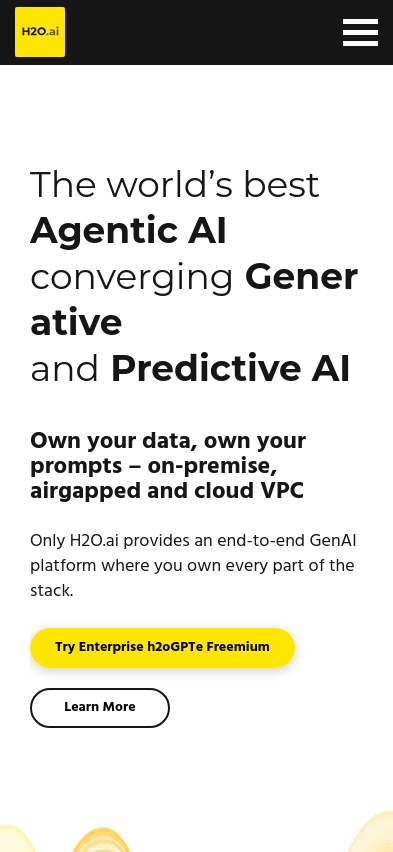
H2O.ai offers a versatile Generative AI platform for multiple industries, featuring solutions for automation, scalability, and customization, recognized as a leader in AI developer services.
About | About | About | About | About | About | About | Careers | Contact | News | News | Awards | Contact | About | About | About | About | About | About | About | About | About | About
Summary of H2O.ai Platform and Offerings
1) Company's Key Focus Area H2O.ai focuses on providing advanced AI and machine learning solutions, particularly emphasizing democratizing access to these technologies for enterprises. Their platform is designed to cater to various AI-driven applications, including generative AI (GenAI) and predictive AI, across multiple industries such as finance, healthcare, and retail.
2) Unique Value Proposition and Strategic Advantage H2O.ai's main value proposition lies in its end-to-end Generative AI platform that supports both on-premises and cloud deployments, allowing organizations to maintain control over their data and prompts. This platform caters to a wide scale of deployments, offering customization and integration with various large language models (LLM) and hosting options.
Strategically, H2O.ai gains an edge by offering a comprehensive suite that integrates predictive AI capabilities, automated machine learning (AutoML), and open-source friendliness, allowing for enterprise-grade AI solutions that are both cost-effective and scalable. The platform supports multi-cloud and on-premise deployments, thus reducing reliance on third-party providers and enhancing data privacy and control for enterprises.
3) Delivering on Their Value Proposition H2O.ai delivers on its promise through several avenues:
-
H2O AI Cloud: This platform serves as the foundation for deploying AI services either on managed, hybrid, or fully on-premise infrastructures, ensuring flexibility and control for businesses.
-
h2oGPT and Open Source Offerings: Customers can customize and deploy open-source AI models, thus developing digital assistants tailored to specific business needs. By leveraging open-source frameworks, H2O.ai empowers enterprises while maintaining cost efficiencies and data control.
-
Predictive AI Tools: Solutions like H2O Driverless AI offer automated machine learning capabilities that streamline the AI development process, making it accessible even to organizations without deep technical expertise.
-
H2O Document AI and Other Models: Focused on automating document processing with AI technologies such as Optical Character Recognition (OCR) and natural language processing (NLP), these solutions enhance business process efficiencies.
-
Generative AI with h2oGPTe: This component connects various LLMs within a scalable framework that includes features like summarization, cost controls, and guardrails.
-
Eval Studio and LLM Studio: Tools for performance assessment and fine-tuning of language models ensure the reliability and safety of AI applications.
H2O.ai's strategic use of comprehensive end-to-end platforms, flexible deployment options, and a robust open-source model ensures that businesses can leverage advanced AI capabilities aligned with their specific operational needs while maintaining control over their data and reducing overall costs.
Scale AI
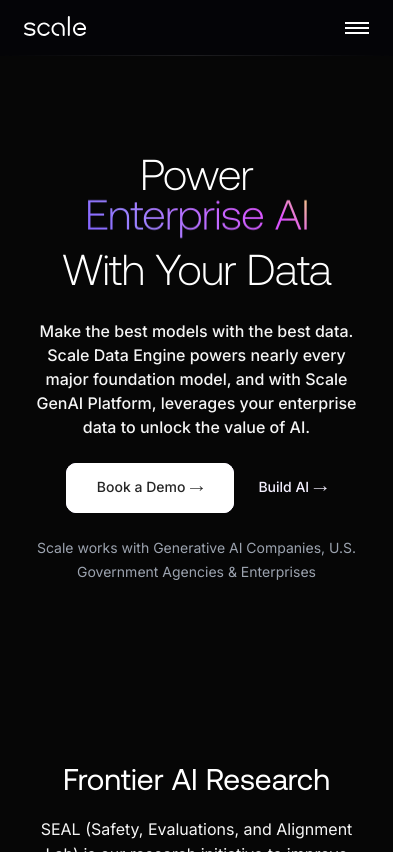
Scale collaborates with AI companies and government agencies, providing high-quality data labeling, innovative evaluations, and customized generative AI applications to enhance AI model capabilities.
-
Key Focus Area: Scale AI's primary focus is on providing comprehensive AI and machine learning solutions across various sectors, including enterprises, government entities like federal agencies, the automotive industry, and public sectors. The company emphasizes supplying data management services crucial for training AI models, with their technology underpinning numerous generative AI and machine learning applications.
-
Unique Value Proposition and Strategic Advantage: Scale AI differentiates itself through its robust data engine, which combines AI-driven automation with human expertise to generate high-quality datasets tailored to specific AI goals. This capability is critical for organizations aiming to develop precision-driven AI models. Notably, Scale also offers expert evaluations and red teaming to pinpoint potential vulnerabilities in AI systems, ensuring they are safe, trustworthy, and aligned with clients' needs. Its collaboration with leading model developers and its compliance with industry standards further solidify its strategic edge.
-
Execution of Value Proposition:
- Data Curation and Annotation: Scale AI employs its data engine to collect, curate, and annotate data, ensuring that AI models have access to accurate, diverse, and expansive datasets. This is supplemented by their AI-assisted labeling services which offer scalability and efficiency.
- Generative AI Platforms: By implementing its full-stack Generative AI Platform, Scale facilitates the deployment of tailored AI solutions using enterprise-specific data. This platform is adaptable for creating custom applications across different industries, including autonomous vehicles, defense, and government systems.
- Collaborations and Integrations: The company partners with AI industry giants like OpenAI, Microsoft, and Meta to integrate its models within these ecosystems, enhancing the capabilities and reach of its AI applications.
- Safety, Evaluation, and Monitoring: By using its SEAL lab and proprietary evaluation datasets, Scale AI delivers precise model evaluations, ensuring that both existing and developing AI models meet safety and performance standards continuously.
Scale AI positions its offerings as end-to-end solutions, ensuring clients can navigate the entire machine learning lifecycle effectively, from strategy development through to deployment and ongoing monitoring, with the aim to accelerate AI adoption and value realization across sectors.
Databricks

Databricks enables organizations to develop AI applications, democratize data insights, reduce costs, and manage AI governance effectively while maintaining data privacy.
Key Focus Area:
Databricks is primarily focused on offering a comprehensive platform that unifies data, analytics, and artificial intelligence (AI) capabilities. The company emphasizes streamlining data operations and harnessing AI to derive actionable insights and innovative solutions from extensive data pools. This integrative approach notably addresses the challenges of data silos, scaling data applications, and maintaining robust data governance protocols.
Unique Value Proposition and Strategic Advantage:
- Unified Data Platform: Databricks champions the "Lakehouse" architecture, which merges the capabilities of data warehouses and data lakes. This architecture supports scalability, flexible data management, and a seamless transition between analytics and AI outputs.
- Open Source and Open Standards: By building on well-established open-source platforms like Apache Spark, Delta Lake, and MLflow, Databricks ensures that data remains open, flexible, and free from restrictive proprietary systems. This open framework facilitates secure data sharing and seamless integration across various computing platforms.
- Multi-Cloud Capabilities: The platform leverages integrations with major cloud providers (AWS, Azure, and Google Cloud) to offer flexibility and scalability tailored to existing cloud ecosystems. This adaptability allows businesses to efficiently manage resources and extract insights across different environments.
How They Deliver on Their Value Proposition:
- Innovative Data Tools: Databricks provides a suite of tools for efficient data management, including real-time analytics, data engineering for ETL processes, machine learning for AI applications, and governance tools ensuring compliance and data security. These tools support an integrated flow from raw data to sophisticated analytics and AI applications, simplifying the data lifecycle.
- Partner Ecosystem: Databricks collaborates with technology and consulting partners to offer tailored solutions and services. This network expands the versatility of the platform through custom integrations and additional expertise in deploying and managing data solutions.
- Support and Training Services: To ensure that users can leverage its platform effectively, Databricks offers training, certification programs, and community support. The Databricks Academy, webinars, and industry-aligned resources empower organizations to upskill teams and enhance competency in managing data and AI tasks.
- Startup and Executive Outreach: The company extends its offerings by engaging with startups and executive teams to propagate adoption of data-driven strategies for business growth. These efforts are underscored by free access to credits and resources for startups, and strategic insights tailored for C-level execution of data and AI initiatives.
Overall, Databricks positions itself as a facilitator for organizations aspiring to become data-oriented enterprises, emphasizing innovations that unify data operations and accelerate time-to-insight for competitive advantage. Through combining open-source standards, tailored partnerships, and advanced analytics capabilities, the platform endeavors to transform data into a pivotal asset for business strategy and operations.
DataRobot

DataRobot offers AI applications and platforms that enhance business impact and reduce risk, helping companies innovate and optimize operations with proven success stories.
DataRobot Summary
-
Key Focus Area: DataRobot specializes in delivering AI applications and platforms tailored for enterprise environments. Its focus is on enabling businesses across various industries such as energy, financial services, healthcare, manufacturing, and the public sector to develop, deliver, and govern generative and predictive AI at scale. It aims to integrate AI into core business processes, enhancing efficiency and innovation.
-
Unique Value Proposition and Strategic Advantage: DataRobot's unique value proposition lies in its comprehensive integrated solutions within the AI ecosystem:
- Integrated AI Suite: Combines generative and predictive AI frameworks with a focus on AI governance and observability.
- Enterprise-Grade Features: Its platform offers tools for building custom AI solutions that integrate smoothly with existing business processes.
- Automation and Efficiency: Clearly emphasizes a reduction in time-to-value for AI deployment by providing pre-built tools to automate AI application delivery.
-
How They Deliver on Their Value Proposition: DataRobot delivers its value proposition through a series of strategic implementations:
- Modular Yet Unified Platform: The AI platform includes a suite of applications and tools like Enterprise AI Suite, AI Apps, and AI Foundation for integrating and managing AI efficiently.
- Comprehensive Governance Framework: Ensures compliance and risk management by automating documentation and providing built-in guardrails for models, supporting various AI regulations.
- Customer Focused Solutions: The platform is industry-agnostic and supports adaptability across energy, healthcare, financial services, etc., with custom deployments tailored to client needs.
- Edge Deployment and Real-Time Monitoring: DataRobot allows for deploying AI models on the edge, delivering real-time anomaly detection and operational monitoring.
- Support Services: Offers services including quick-start programs and AI development workshops to facilitate the adoption and integration of AI capabilities within business frameworks.
In summary, DataRobot focuses on empowering businesses with scalable and secure AI solutions. Its strategic advantage is its integrated platform that simplifies AI application development and governance, allowing organizations to harness AI’s potential while managing risks and compliance efficiently. Using a mix of generative and predictive AI, it addresses diverse business needs, offering tools to optimize processes from operational efficiencies to enhancing customer experiences.
MOSTLY AI Inc.
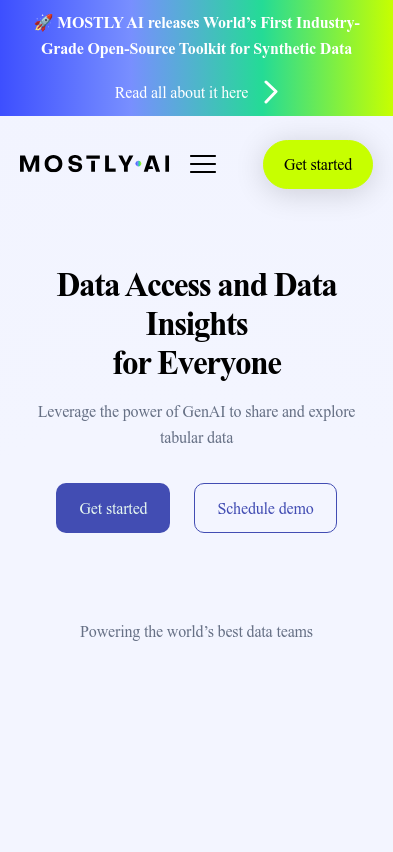
MOSTLY AI provides synthetic data solutions that leverage AI technology for privacy-compliant data.
Leadership | Leadership | Leadership | Leadership | Leadership | Leadership | Leadership | About | About | About | About | About | About | About | About | About
The company is focused on helping businesses unlock the potential of their proprietary data through synthetic data generation. Synthetic data refers to artificially created data that mirrors the statistical properties of real data, but without including any personal identifiable information (PII). This makes it possible for organizations to use and share data without compromising privacy regulations such as GDPR or CCPA.
Key Concepts and Benefits of Synthetic Data:
-
Data Anonymization and Privacy: Traditional anonymization methods often destroy the utility of data. Synthetic data retains the statistical properties and correlations from the original datasets, providing a privacy-safe alternative that mitigates risks like re-identification.
-
Generative AI Models: The company employs advanced AI models, such as Generative Adversarial Networks (GANs), to create synthetic data. These models learn from real-world data to generate new, artificial data that maintains the same analytical value, but does not contain any actual data points from the original dataset.
-
Data Democratization: By using synthetic data, organizations can make data more accessible across departments and partner organizations without risking sensitive information exposure. This facilitates innovation, research, and development while ensuring compliance with stringent privacy laws.
-
AI/ML Development and Testing: Synthetic data is pivotal for training machine learning models, especially in situations where original data is scarce, sensitive, or biased. It can also be used to generate synthetic test data for software development, ensuring robust and efficient testing environments.
-
Versatility Across Industries: The applications of synthetic data span many sectors including finance, healthcare, retail, and public services. For example, healthcare institutions can share synthetic patient data for research purposes without breaching privacy regulations, while banks can develop fraud detection algorithms with synthetic transactional data.
Platform Features:
-
User-friendly Interface: The platform is designed to be intuitive and accessible, requiring no specialized expertise to generate synthetic data. It can seamlessly integrate with existing data infrastructure, supporting wide data types including numerical, categorical, and even relational database structures.
-
Privacy and Security by Design: The platform ensures data privacy through mechanisms like model overfitting prevention, rare category protection, and tools to handle outliers and extreme values. It complies with ISO 27001 and SOC 2 standards, offering on-premises or private cloud deployment for enhanced data security.
-
Python Client and API Support: Users can control synthetic data generation directly from a Python environment, making it particularly attractive for data scientists and developers who need to streamline workflows and maintain compliance during data manipulation and analysis.
Use Cases and Industry Adoption:
-
Data Sharing: Most organizations face challenges with data access and sharing, particularly due to privacy regulations. Synthetic data enables compliant data sharing both internally and with external partners, thus speeding up processes that would otherwise be hindered by regulatory or privacy constraints.
-
Innovative Applications: As many as 75% of companies are expected to use generative AI to create synthetic customer data by 2026. This shift is expected to drive new business models and insights while maintaining customer privacy.
Educational Resources and Support:
-
Blog and Podcasts: The company offers educational content through blogs and podcasts that provide insights into the latest developments in synthetic data, data democratization, and AI advancements.
-
Documentation and Support: Comprehensive documentation and user support are available for those looking to understand or integrate the synthetic data platform into their operations.
In summary, synthetic data serves as a compelling tool for organizations striving to leverage data analytics while safeguarding personal privacy and adhering to global data protection laws. The company's platform offers a comprehensive set of tools and features designed to empower businesses in effectively harnessing the power of synthetic data.
Domino Data Lab
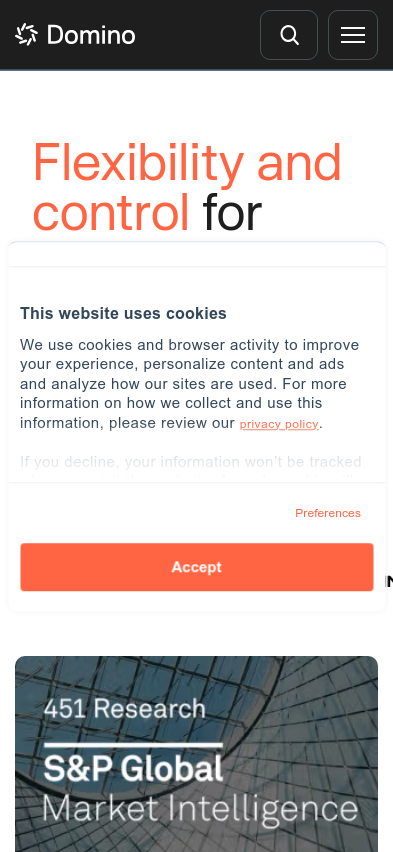
Domino Data Lab is a company that offers an enterprise AI platform designed to build, deploy, and manage AI applications. They provide a unified environment for data access, tools, compute resources, and project management to accelerate and scale AI initiatives while ensuring governance and reducing costs.
Domino Data Lab provides an enterprise AI platform that aims to simplify the deployment, management, and governance of AI and data science initiatives. Their platform facilitates collaboration, reduces costs, and allows for the scalable application of AI technologies across various organizational environments.
Here are the key elements of Domino's offerings explained by their content:
Platform Capabilities:
-
Unified Platform: Domino offers a single interface for building, deploying, and managing AI, designed to foster collaboration and standardize best practices across teams.
-
Open Ecosystem: The platform supports a wide array of open-source and commercial tools, allowing enterprises to avoid vendor lock-in and leverage the best industry innovations.
-
Flexible Infrastructure: Through a hybrid multicloud approach, Domino can run AI workloads wherever data is stored, whether on-premise, in the cloud, or in a hybrid environment, optimizing costs and performance.
-
Governance Features: Domino emphasizes comprehensive governance with turnkey solutions for model oversight, compliance, and risk management, ensuring that AI deployments meet regulatory standards.
Benefits for Different Stakeholders:
-
For Data Scientists: Domino promises flexibility and autonomy with on-demand access to tools and infrastructure, a streamlined environment for experimenting and developing models, and features to ensure reproducibility and collaboration.
-
For Data Science Leaders: The platform enables efficient project management and collaboration across teams, with centralized visibility into models and workflows, enhancing productivity and delivery speed.
-
For IT Leaders: Domino assures a secure and compliant infrastructure, reducing the complexity of supporting data science initiatives and minimizing idle resources through efficient resource management.
Industry Applications:
Domino's platform is used across various sectors, including life sciences, financial services, manufacturing, and government. Key applications involve drug discovery, risk management, manufacturing optimization, and defense initiatives, among others.
-
Life Sciences: Supports end-to-end pharmaceutical workflows from R&D to clinical trials, ensuring data integrity and accelerating time-to-market for therapies.
-
Financial Services: Used for comprehensive data analysis and model deployment to enhance risk management and financial predictions, as demonstrated by partners like Moody's Analytics.
-
Government and Defense: Utilized by organizations such as the U.S. Navy for improving intelligence systems and decision-making processes with reliable AI models.
Additional Resources:
Domino provides various educational resources, like eBooks and webinars, to guide organizations in responsibly managing AI and to foster data-driven innovation. They also host weekly demos to showcase their platform capabilities.
ROI and Case Studies:
Domino highlights significant returns on investment (ROI) through case studies, such as a reported 542% ROI according to a Forrester study, emphasizing cost and time savings achieved by organizations using their platform.
Security and Compliance:
The platform prioritizes security and compliance, offering features like built-in encryption, audit trails, and integration with existing security systems to ensure data protection and meet regulatory requirements.
Overall, Domino aims to provide an adaptable solution for enterprises seeking to harness AI's potential while ensuring governance, compliance, and collaboration across teams and projects.
ClosedLoop.ai

ClosedLoop.ai provides healthcare-specific machine learning predictions.
ClosedLoop.ai offers an AI-driven platform designed to enhance healthcare outcomes through predictive analytics. The platform is geared towards various healthcare organizations, including providers, ACOs, payers, digital health companies, and the pharmaceutical and life sciences sectors. It aims to improve outcomes by identifying individuals at risk of adverse health events, thereby facilitating proactive interventions.
Key Services and Solutions:
-
Providers & ACOs: The platform assists providers and ACOs by predicting future health needs, enabling targeted interventions to reduce costs and improve outcomes. Predictive analytics support stratifying patient populations to deliver timely care.
-
Payers: For insurance payers, ClosedLoop's AI tools help identify high-risk members, guiding interventions to improve clinical outcomes and lower healthcare costs. The platform offers tools for measuring program impacts and optimizing member care costs and utilization.
-
Pharmaceuticals & Life Sciences: The organization helps identify key populations and segments with unmet medical needs, optimizing therapy lines and enhancing outcomes with their predictive analytics capabilities.
-
Digital Health: ClosedLoop supports digital health companies by augmenting their solutions with data-driven insights, improving consumer engagement and clinical value delivery.
Technology and Platform Features:
-
AI/ML Platform: The ClosedLoop platform is recognized for its capabilities in building, deploying, and monitoring AI models in healthcare settings. It won the CMS AI Health Outcomes Challenge and claims accolades like Best in KLAS for data science solutions.
-
Data Science Automation: The platform streamlines data preparation and analytics, allowing healthcare organizations to focus on delivering insights rather than the backend processes. This includes integrating various healthcare data types to enhance AI model accuracy.
-
Healthcare Content Library: Offers templates for healthcare-specific predictive models, machine learning features, and data transformation, thus accelerating time to value.
Use Cases:
ClosedLoop provides a comprehensive suite of predictive analytics use cases:
- Readmissions: Identification of patients at high risk for readmission, allowing for proactive planning.
- Chronic Kidney Disease: Raises awareness for early diagnosis and management.
- Emergency Department Utilization: Helps reduce unnecessary visits by predicting avoidable utilizations.
- Hospital Admissions: Targets reduction of unplanned admissions to lower associated costs.
Program Management and Evaluation:
ClosedLoop provides tools to measure and enhance the impact of health programs, focusing on understanding their clinical and financial effectiveness and ensuring continuous improvement.
Resources & Recognition:
The platform offers various resources, including case studies, events, webinars, and white papers aimed at deepening user understanding and best practices in healthcare AI/ML implementation.
- Awards & Recognition: ClosedLoop has been recognized for its data science solutions with multiple awards including being the Best in KLAS for three consecutive years and winning the CMS AI Challenge.
Community Engagement:
ClosedLoop organizes events and webinars to educate and update stakeholders on healthcare data trends and developments. It actively contributes to discussions on AI in healthcare, focusing on evolving regulatory landscapes and implementation challenges in AI-driven programs.
Conclusion:
ClosedLoop.ai positions itself as a versatile partner for healthcare entities, providing AI and machine learning solutions to improve healthcare quality and operational efficiency. Through its specialized platform and resources, it facilitates precise, proactive interventions to manage patient health effectively.
LandingAI
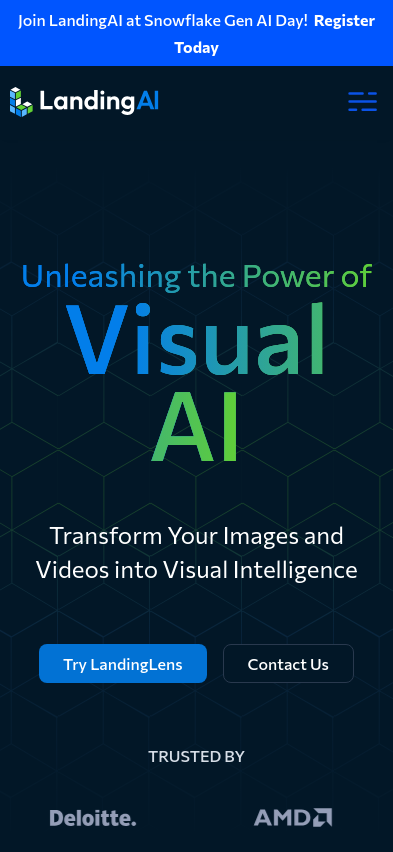
LandingAI provides AI solutions for business workflows in computer vision, aiding companies in transitioning from AI prototypes to large-scale production. LandingAI offers AI solutions with a primary focus on computer vision applications, enabling businesses to move from concept to production effortlessly.
LandingAI is a company that specializes in visual AI solutions, particularly through its platform called LandingLens. This platform aims to revolutionize the deployment and scaling of computer vision tasks by simplifying the build and deployment processes. Here are the main highlights:
Products and Features:
-
LandingLens: This is an end-to-end visual AI platform designed to help users build, deploy, and manage computer vision models. The platform is tailored for tasks involving image and video processing to extract visual intelligence.
- Ease of Use: LandingLens is designed to be user-friendly, requiring no advanced AI expertise. Users can set up a vision model from labeling images to model deployment quickly using an intuitive interface.
- Data Consistency: Employs Data-Centric AI approaches to ensure data quality and consistency, which helps in dealing with small datasets. Advanced labeling technology helps detect and correct mislabeled images.
- Integration and Deployment: The platform supports flexible deployment options, enabling models to operate both in the cloud and on edge devices. Continuous learning allows models to stay updated with new data.
-
VisionAgent: A GenAI-powered tool that serves as an app builder for developers who want to create vision-enabled applications. It offers model selection, automatic code generation, and deployment options.
-
LandingLens on Snowflake: Delivers visual AI functionalities directly within the Snowflake ecosystem, allowing for streamlined vision tasks without data transfer. This integration ensures data privacy and facilitates large-scale implementations.
Industry Applications:
LandingAI's technologies are used across various industries to improve efficiency, quality, and productivity:
- Automotive: Assists in complex inspection tasks such as weld inspections and condition monitoring. Helps in automated machine solutions for defect detection.
- Electronics: Enables precision inspection of PCBs and solder quality tasks, addressing complex quality assurance challenges.
- Biotech/Pharmaceutical: Provides solutions for complex tasks such as vial inspection and cell counting, contributing to reliable diagnostics and quality control.
- Agriculture: Aids in harvesting and crop yield optimization using AI tools that reduce the manual labor burden on farmers.
- Manufacturing: Offers visual inspection capabilities to improve defect detection, process monitoring, and overall production yield.
Resources and Support:
The company provides various resources, including:
- Case Studies, Blogs, and Tech Briefs: To keep stakeholders informed about the latest trends and applications in AI.
- Community and Academy: Resources aimed at educating and engaging users with training materials and collaborative forums.
- Developer Support: Includes access to documentation, GitHub repositories, and Python libraries, enhancing the usability of LandingAI's solutions.
Additional Information:
- Partnerships: Engagement in events like Snowflake Gen AI Day, signaling collaboration with other technology platforms.
- Corporate Presence: Headquarters located in Palo Alto, CA, with a corporate structure offering insights into the company's operation and career opportunities.
LandingAI appears committed to democratizing AI implementations by reducing technical barriers and enhancing model efficiency. Their platform supports industries in implementing AI-driven solutions to increase operational capabilities and output quality.
Smartloop
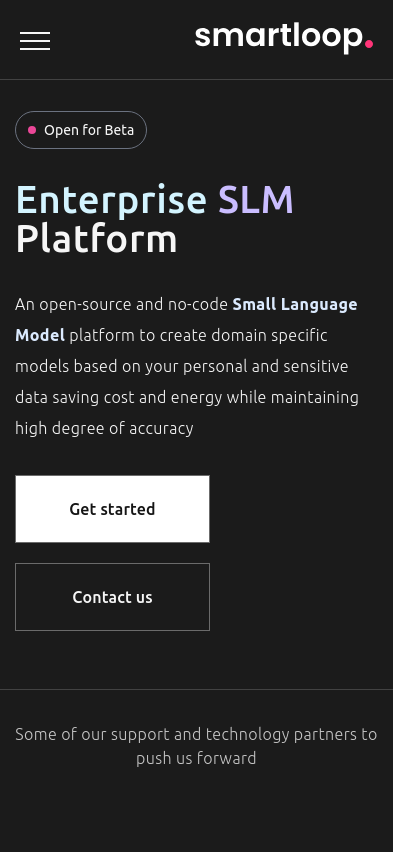
Smartloop offers a business growth solution with chatbot building tools, message broadcasting, omni-channel deployment, analytics, and cloud infrastructure.
Smartloop provides a platform leveraging Small Language Models (SLM) to transform static information into a dynamic knowledge base. Below is an overview extracted from company-authored content about their services and offerings:
Platform Overview and Features
- Platform Use & Functionality: The service is designed for private cloud and on-premise environments, targeting business use. Users can upload documents through a web user interface and engage with them using an AI assistant, which offers an effective blend of cost-efficiency and performance.
- Security & Privacy: The solution emphasizes privacy by allowing deployment within private infrastructures, minimizing exposure to external threats.
- Model Deployment: Users have the flexibility to run fine-tuned models locally or behind their firewall, leveraging large language models in a smaller, more manageable format.
Offerings
- Training & Customization: The platform supports training and fine-tuning models using a method called LoRA (Low Rank Adaptation), which provides efficient use of memory and processing resources.
- Document Processing: Includes capabilities for processing, chunking, and vectorizing documents.
- Cost Management: A tiered pricing model begins with a free service allowing upload of a 5MB document, with plans for subscription services to expand this capacity.
- SLM Explained: Small Language Models are described as scaled-down versions of large language models that are capable of numerous tasks, including sentiment analysis and data retrieval.
Technical and Support Structure
- Base Model: Uses Llama 3 as its foundational model, supporting open-source principles.
- Infrastructure: Utilizes Nvidia A-series GPUs for powerful model training and deployment either on-premise or via cloud services.
- Support Services: The platform promises ongoing updates and improvements, alongside robust support for deployment planning and operation efficiency.
- Uptime: It guarantees a 99.5% uptime, ensuring steady operability.
Access and Engagement
- User Engagement: Users can interact with the platform by signing up via email or Google, with features for creating accounts and password management.
- Contact & Terms: Prospects and users are encouraged to submit their needs through a structured contact form, and terms of use are readily accessible.
Additional Services
- Collaboration & Partnership: The site hints at opportunities for users to collaborate on custom model development by reaching out directly.
- Developer Resources: Provides tools and support for developers to enhance their use of the platform through available resources.
Smartloop’s offering centers on enhancing organizational efficiency and performance via advanced AI-driven language processing while maintaining a strong focus on security and customization to meet unique business needs.
Loop.AI
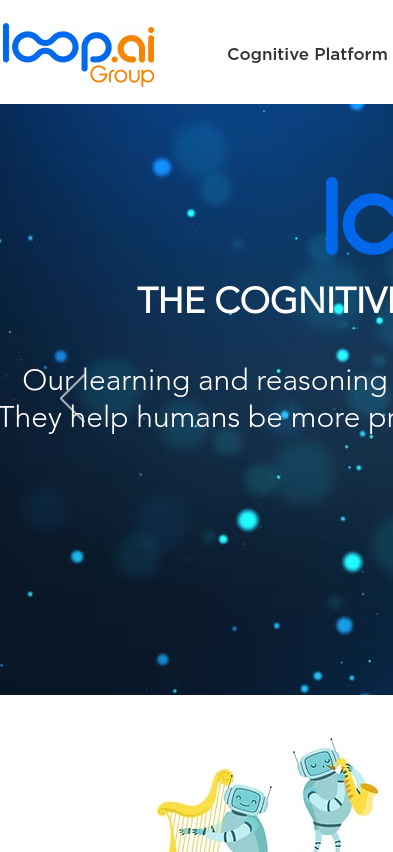
Loop.AI is one of the AI startups located in HSR Bangalore, involved in artificial intelligence technologies.
Loop AI Group offers advanced cognitive computing solutions through its Loop Q Cognitive Platform, which is designed to automate tasks using artificial intelligence (AI) technology. The platform, known for its unsupervised learning capabilities, allows it to process both structured and unstructured data without human intervention. Here's an overview of the platform’s features, applications, and solutions:
Platform Overview:
- Unsupervised Learning: Loop Q can autonomously learn from data in any language without requiring predefined labels or human guidance. This distinguishes it from many other AI technologies that rely on supervised learning.
- Deployability: The Loop Q platform can be deployed both on-premise and in the cloud, making it versatile for diverse data security requirements.
- Languages: Loop Q is capable of processing over 15 languages, understanding industry-specific jargon, slang, and unstructured inputs like typos.
Key Features:
- Ease of Deployment and Maintenance: The system is fast to deploy and easy to maintain. It integrates with existing legacy systems to enhance their capabilities.
- Continuous and Automatic Learning: Loop Q continually adapts to new data without requiring manual updates, maintaining high accuracy across various industries.
- Natural Language Processing (NLP): It is designed to quickly glean meaning from language data, which allows for cognitive robotic process automation (RPA) and cognitive applications.
Applications & Solutions:
- Industry Applications: Loop Q is suitable for multiple industries such as banking, insurance, government, and more, providing tailored solutions for back-office automation, customer acquisition, call centers, and predictive maintenance.
- Pandemic Response: The platform assists companies in managing disruptions, particularly during the COVID-19 crisis, by automating up to 85% of help-desk requests and reducing human error, thereby increasing efficiency.
- Cognitive Roadmap: Loop AI provides a structured approach to cognitive transformation in organizations by helping them design a roadmap for integrating AI technologies to optimize processes.
Cost and Efficiency:
- Cost Efficiency: The platform provides significant cost savings compared to traditional human workforces, with reduced hours required due to its automation capabilities. Loop Q robots cost approximately $0.6 per hour, in contrast to the human average of $17 per hour.
- Productivity: Automation leads to a reduction in task errors and improves the overall employee experience, freeing knowledge workers to focus on more complex tasks.
Human Capacity Augmentation:
- The Loop Q platform does not aim to replace human workers but instead to augment their capabilities, making use of cognitive AI to support and enhance human tasks, boosting productivity and accuracy.
Partner and Community Engagement:
- Partnerships: Loop AI has a network of Certified Partners who help organizations leverage its platform’s capabilities in their digital transformations.
- Research & Development: The company maintains a focus on innovation in AI, and employs experts from prestigious AI research backgrounds.
Resources:
- Loop AI offers a variety of resources including whitepapers, analyst reports, and videos to educate stakeholders on cognitive computing and demonstrate the platform’s capabilities.
Overall, Loop AI Group's Loop Q Cognitive Platform presents an advanced solution for organizations looking to integrate AI into their operations, focusing on cognitive automation and enhancing human work processes across various industries.
HiddenLayer

HiddenLayer provides software-based platform to monitor machine-learning algorithm inputs and outputs.
HiddenLayer is a company that specializes in providing security solutions for artificial intelligence (AI) systems. The focus is on safeguarding machine learning models and assets against a variety of cyber threats such as adversarial attacks, inference, bypass, extraction, and model theft. Here are key elements outlined in the company's web content:
Products and Solutions
-
AISec Platform: A comprehensive AI Protection Suite designed to ensure the integrity of AI models throughout the machine learning operations (MLOps) pipeline. It offers real-time monitoring and response capabilities to detect prompt injections, adversarial attacks, and digital supply chain vulnerabilities.
-
Model Scanner: This tool examines AI models for vulnerabilities, malicious code, and potential tampering, particularly important for models sourced from public repositories like open-source platforms. Its integration with Microsoft Azure AI enables further protection by scanning third-party and open-source models for cybersecurity risks.
-
Automated Red Teaming for AI: Provides security teams with automated vulnerability assessments for AI models, simulating sophisticated attacks to identify and mitigate potential threats without requiring expert knowledge from security personnel.
-
AI Detection & Response: Focuses on protecting generative AI (GenAI), offering solutions for real-time monitoring and threat mitigation across MLOps environments.
Industries Served
-
Finance: In the financial sector, HiddenLayer's tools help protect sensitive data and AI model integrity against adversarial and model theft attacks, while assuring regulatory compliance.
-
Public Sector: Protects governmental AI operations by ensuring model security and integrity, enhancing interoperability between systems, and reducing redundancy in manpower requirements.
-
Tech Sector: Offers scalable security solutions that evolve with the company's growth in AI operations, focusing on protecting AI-generated content and intellectual property from breaches.
Strategic Alliances and Recognition
HiddenLayer has established partnerships and alliances that bolster its market presence and security offerings:
-
Collaboration with Microsoft Azure enhances cybersecurity measures for Azure AI customers, ensuring the secure development and deployment of AI technologies.
-
Recognized as a "Cool Vendor" in AI Security by Gartner, highlighting its innovative approach to AI protection.
Research and Trends
-
Insights and Research: HiddenLayer emphasizes ongoing research into AI threats, offering resources such as guides, webinars, and podcasts discussing evolving risks and security techniques.
-
Regulatory Compliance: The company keeps abreast of international AI safety and data protection standards, ensuring its solutions align with guidelines such as those from NIST and European Union's AI Act.
-
Innovation Hub: Hosts comprehensive resources, including insights, reports, and tools that help organizations enhance their AI governance and security posture.
Customer Engagement
-
Offers tailored services like Adversarial ML training and risk assessments to boost clients' internal capabilities in AI security and response readiness.
-
Encourages potential customers and partners to engage in demos and consultations to better understand their AI security needs and how HiddenLayer can address them effectively.
With strategic backing from investors including Microsoft's Venture Fund and several other prominent venture firms, HiddenLayer positions itself as a pivotal player in ensuring the security and resilience of AI technologies across various sectors.
Dataloop

Dataloop provides a data management and annotation platform for AI training data to enhance machine learning capabilities.
Dataloop provides a comprehensive AI development platform designed to facilitate efficient and rapid creation of AI applications, focusing on various key areas to support data teams.
Platform Features:
-
Data Management:
- Users can handle vast quantities of unstructured data using automated preprocessing and data exploration tools.
- Data can be curated, versioned, and filtered for creating robust AI applications.
-
Model Support:
- The platform supports both pre-trained AI models and user-defined models, allowing for fine-tuning and version management.
- Dataloop includes a Model Marketplace for accessing a variety of the latest AI models.
-
Pipelines:
- Dataloop’s pipeline builder integrates data, models, element orchestration, and human feedback for workflow creation.
- Offers drag-and-drop and code-based (Python SDK) interfaces to create AI pipelines.
-
Application Development:
- The platform provides a function-as-a-service offering, enabling developers to write, run, and manage application code without extensive infrastructure setup.
-
Human Feedback Integration:
- The platform emphasizes the role of human feedback in AI development, incorporating it into the pipeline with specialized annotation tools.
- Enhancements like the AI Annotation Assistant and consensus features are present to optimize annotator productivity.
-
Marketplace:
- Dataloop’s Marketplace offers templates, models, and applications, promoting rapid application development and minimizing setup time.
-
Security Measures:
- Compliance with GDPR, ISO 27001, and SOC 2 Type II is maintained, alongside security features like RBAC, 2FA, and AES-256 encryption, ensuring robust data security and privacy.
Target Users:
-
Data Engineers:
- Benefit from a large repository of models and templates, combined with extensive cloud integration.
-
Data Scientists:
- Gain automation in model training and human feedback processes to focus on experimentation and model development.
-
Software Engineers:
- Utilize complete code-level control through an API and SDK, easing the integration of data pipelines into AI applications.
-
AI & Data Leaders:
- Facilitate cross-functional collaboration in building AI applications while managing datasets and models effectively.
-
Human Reviewers:
- Use intuitive annotation tools for efficient feedback integration, aiding in improving AI model performance.
Use Cases:
- The platform supports various AI workflows including active learning, Generative AI validation, AI deployment, and more.
- Supports industry-specific solutions like smart retail, drone and aerial imagery, robotics, autonomous vehicles, precision agriculture, and media content management.
Security & Compliance:
- Dataloop prioritizes data privacy and protection, complying with global security standards.
- Offers secure authentication methods and maintains detailed monitoring of system activities.
Value Proposition:
- The platform simplifies complex AI tool stacks, offering a single space to build, deploy, and manage AI applications.
- It supports rapid project initiation and scaling, providing dedicated functionalities for different roles within data teams.
Additional Information:
- Dataloop offers extensive documentation, community resources, and partnership opportunities with companies like NVIDIA and Microsoft.
- A demo of the platform can be booked for a hands-on experience.
In summary, Dataloop provides an integrated and secure environment for developing AI applications efficiently, with a range of tools that cater to several roles in AI and data operations. The platform aims to reduce development time, enhance collaboration, and facilitate rapid deployment of AI solutions.
Dataiku
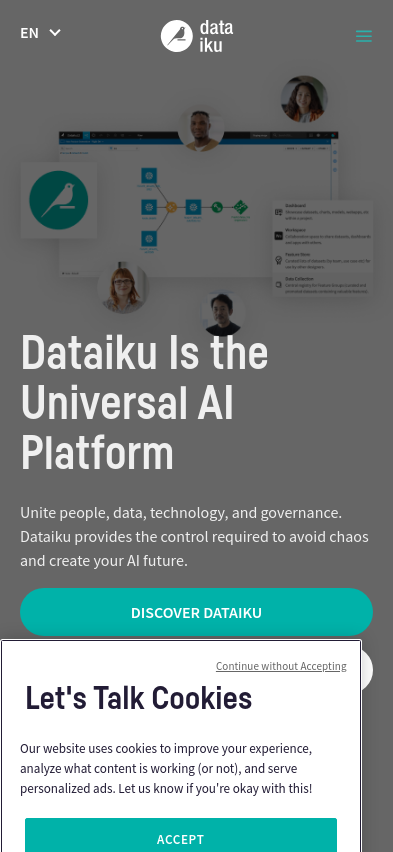
Dataiku develops Data Science Studio, the tool that lets data scientists and analysts do machine learning on any (dirty) data. Dataiku develops Data Science Studio, enabling data scientists and analysts to perform machine learning on any data.
About | About | About | About | About | About | About | About | About | Leadership | About | About
Key Focus Area
Dataiku specializes in facilitating the development and implementation of artificial intelligence within organizations. Their primary focus is to democratize AI, making it accessible for various stakeholders across a company—from business departments to data science teams—through a centralized platform that supports both creation and consumption. Dataiku aims to streamline the AI process, enabling enterprises to efficiently build, deploy, and manage AI and analytics projects across various sectors like banking, life sciences, manufacturing, and more.
Unique Value Proposition and Strategic Advantage
- Unified Platform: Dataiku provides a comprehensive AI platform that brings together disparate data efforts into one governed environment. This single interface is designed to cater to both technical (such as data scientists) and non-technical users (such as business analysts), fostering cross-functional collaboration.
- Flexibility and Integration: The platform supports integrations with major cloud services and technology tools, offering optionality and seamless integration across existing tech stacks. This flexibility allows organizations to scale their use of AI without overhauling current systems.
- Accessibility and Collaboration: By providing both visual interfaces and code-based environments, Dataiku opens up AI capabilities to a broader user base. This mix of tools is geared towards empowering teams to collaborate more effectively, thus, improving agility in AI operations.
Delivery on Value Proposition
- Machine Learning and AI Tools: Dataiku offers robust machine learning tools, including AutoML, which accelerates model development and reduces the complexity of creating AI applications. It supports custom coding for those who require more tailored solutions as well.
- Data Preparation and Management: The platform allows users to connect, cleanse, and prepare data at scale, using both visual workflows and coding options. This dual-approach ensures data quality and readiness for analysis, regardless of user proficiency.
- Governance and Security: Comprehensive AI governance capabilities are built into the platform, helping organizations meet compliance standards and manage risk while deploying AI solutions. This is crucial for maintaining trust and ensuring that AI projects align with broader business objectives.
- XOps Management: Through a unified platform, Dataiku integrates operational management (XOps) of AI portfolios, allowing for cohesive management of projects and workflows. This integration streamlines AI operations and simplifies the monitoring and deployment of models.
- Industry-Specific Solutions: Dataiku provides tailored solutions for industries like pharmaceuticals, manufacturing, insurance, and more. These targeted solutions are designed to leverage AI for specific industry challenges, such as optimizing manufacturing processes or personalizing customer experiences in retail.
By anchoring its services in these strategic offerings, Dataiku positions itself as a versatile AI platform that bridges the gap between technical capability and business needs, intending to foster an ecosystem where AI-infused decision-making is commonplace.
Cleanlab
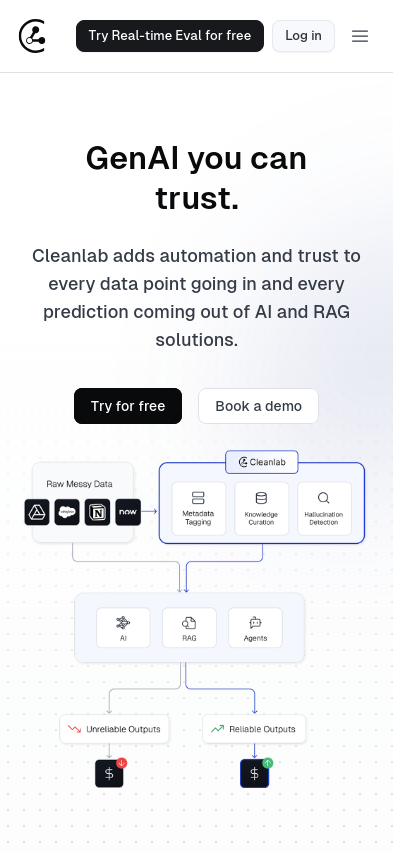
Cleanlab’s AI algorithms find and fix errors in datasets, with the goal of turning unreliable data into reliable models and insights. Cleanlab’s AI algorithms find and fix errors in datasets, turning unreliable data into reliable models and insights. CleanLab is involved in the evaluation, observability, and experiment tracking aspects of machine learning. Cleanlab’s AI algorithms find and fix errors in datasets, with the goal of turning unreliable data into reliable models and insights.
Cleanlab.ai Company Summary:
1) Key Focus Area: Cleanlab focuses on enhancing data quality and reliability for artificial intelligence (AI) and general AI (GenAI) applications. The company's core specialization lies in automating data curation processes to improve data quality for AI models, business intelligence, and analytics tasks. Their platform aims to address errors within data sets, which can negatively impact revenue and hinder the performance of machine learning (ML) and AI solutions.
2) Unique Value Proposition and Strategic Advantage: Cleanlab's unique value proposition is its offering of an AI-powered data curation platform that automates and improves data science and engineering tasks. This platform is characterized by:
- Automated detection and correction of data errors, including label errors, outliers, personal identifiable information (PII), and poor-quality images.
- Addition of intelligent metadata for increased data reliability without needing human input.
- Trustworthy Language Model (TLM) that provides hallucination detection, observability, and trustworthiness scores for AI outputs.
Strategically, Cleanlab leverages automation and artificial intelligence to distinguish its offering from third-party data annotation tools and aims to enable rapid, scalable improvements without requiring code. This speeds up productivity, curtails costs, and enhances data quality assurance significantly.
3) Delivery on Their Value Proposition: Cleanlab executes its value proposition through various functionalities designed around automation in data management:
- Data Curation: Cleanlab Studio automatically refines data by addressing errors and automates metadata addition, making the data more reliable for model training and analytics.
- Trustworthy AI Systems: The system detects hallucinations in GenAI systems, ensuring high-quality outputs using Cleanlab’s Trustworthy Language Model for improved response quality.
- Automated Labeling: The platform offers domain-specific automated labeling, enhancing the labeling process's accuracy and efficiency over traditional methods.
- Analytics and Model Deployment: Users can explore data set summaries, identify classes with labeling issues, and deploy robust models using an advanced AutoML. This includes tasks like data preprocessing, model tuning, and deployment— all aimed at improving data and model performance with minimal user intervention.
Overall, Cleanlab positions itself as a platform providing comprehensive data quality management solutions, designed to integrate automation into each step of the data handling process. This approach not only improves data quality and predictability in AI outputs but also enhances operational efficiency and cost-effectiveness for its clients.
Datacurve
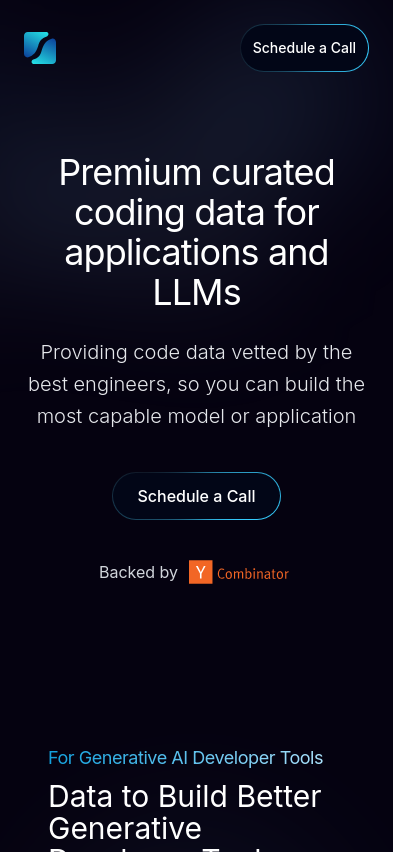
Company providing startups with quality code data from skilled engineers through a gamified annotation platform.
Datacurve AI's key focus area is delivering premium curated coding data designed specifically for applications and large language models (LLMs). This company's primary endeavor is supplying high-quality coding data that is carefully selected and verified by experienced engineers. Their target clientele includes both organizations building generative AI developer tools and foundational model research labs looking to advance state-of-the-art coding capabilities.
Unique Value Proposition and Strategic Advantage:
-
Quality and Expert Verification: Datacurve AI stands out by providing 'textbook-quality' data vetted by top software engineers and subject-matter experts. This ensures that the data is precise and reliable, enhancing model performance significantly.
-
Focus on Specific Use Cases: Datacurve offers sophisticated problem-solving data that addresses complex coding challenges beyond current model capacities. This specialization allows clients to develop applications with advanced intelligence and reasoning capabilities across multiple programming languages and frameworks.
-
Consistency and Volume: With a focus on precise, diverse, and scalable data, Datacurve AI emphasizes three core pillars—accuracy, diversity, and scalability—ensuring data quality meets diverse, edge-case coverage and volume demands.
Delivery on Value Proposition:
-
Curated Data Pipeline: Utilizing a robust and intelligent data pipeline, Datacurve ensures that high-quality data directly translates to improved model accuracy, robustness, and generalizability in machine learning models. High data integrity is maintained, and integrity lapses are mitigated to avoid significant reductions in model performance.
-
Expert Workforce: The company leverages a workforce of skilled annotators, including experienced engineers and industry professionals. This talent pool across North America brings verified educational and professional backgrounds to maintain high standards in data annotation and review.
-
Gamified Data Creation Platform: Datacurve provides a gamified platform for their engineers, enhancing participation and ensuring sustained, high-quality data production. This platform involves various stages of quality assurance using both automatic and human evaluations to close any quality gaps.
-
Customized Development Tools: Customers can define specific use cases, and Datacurve handles the comprehensive data creation process. They provide a variety of developer tools and extensions, such as code generation from design files and intelligent coding copilots integrated into IDEs.
-
Regular Benchmarking and Revisions: Datacurve supports continuous improvement through internal benchmarks and welcomes input from private benchmarks to determine data shortcomings. Clients receive data in a dataset viewer that includes quality metrics, with the option for unlimited revisions to align data standards with business requirements.
In summary, Datacurve AI presents itself as an entity that strengthens coding models through quality data, verified expertise, and a structured approach to data delivery and improvement. Their bespoke service offerings are tailored towards enhancing machine learning models for clients requiring precise and scalable coding solutions.
Kleene
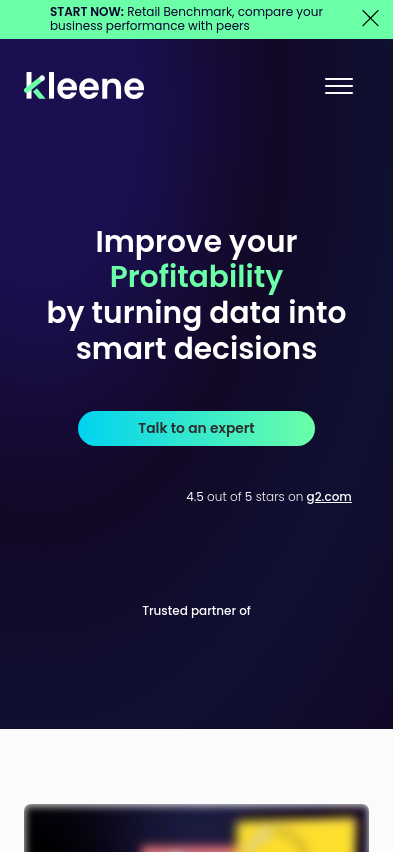
Kleene offers a data consolidation platform that enables businesses to centralize data sources, transforming them into a single language for analysis and collaboration, thus facilitating better data management and insights.
Kleene.ai Overview
1) Key Focus Area:
Kleene.ai's central focus is on empowering businesses to harness the power of data analytics and artificial intelligence (AI) to drive decision-making and optimize operational efficiency. The company emphasizes data integration, data management, AI applications, and analytics consulting, primarily targeting areas like customer acquisition, retention, product optimization, and overall business intelligence.
2) Unique Value Proposition and Strategic Advantage:
Kleene.ai distinguishes itself with the following value propositions:
-
Rapid Deployment and Integration: It offers fast setup times, leveraging over 600+ pre-built data integrations to allow businesses to organize and analyze data swiftly without a lengthy implementation process.
-
Comprehensive, Unified Data Platform: The platform provides a unified approach, organizing data across the organization to create a single source of truth, enhancing accuracy and speed in decision-making without requiring extensive infrastructural changes.
-
AI-Powered Insights and Custom Solutions: Kleene.ai provides pre-built AI models to facilitate advanced analytics, empowering strategic initiatives such as hyper-personalization and supply chain optimization. The company also offers customized solutions for clients lacking required connectors, thus broadening their integration capabilities.
3) Delivery Mechanisms for Their Value Proposition:
Kleene.ai supports its offerings through several mechanisms:
-
Modular Product Offering: Their services are scalable and priced as per modular offerings, allowing customers to select specific solutions based on their needs. This includes tools for ELT (Extract, Load, Transform), AI applications, and data visualization.
-
Supporting Data Ecosystem: With a range of services, such as data consulting and fractional CDO services, Kleene.ai assists businesses without in-house expertise to define and implement data strategy goals effectively.
-
Technical Support and Continuous Improvement: Kleene.ai ensures constant support through data experts and a robust data management platform to handle complex data operations and analytics. They also commit to continuing software enhancement and maintenance, such as building custom connectors as required by clients.
-
Flexible Platform Use: Businesses already utilizing BI tools (like Tableau, PowerBI) can continue using them while integrating Kleene.ai’s robust data models to enhance their analytics processes.
In summary, Kleene.ai positions itself as a comprehensive data solutions partner, offering efficient integration and innovative AI applications that streamline data management, driving strategic business outcomes without necessitating significant changes or upfront investments.
Defined AI
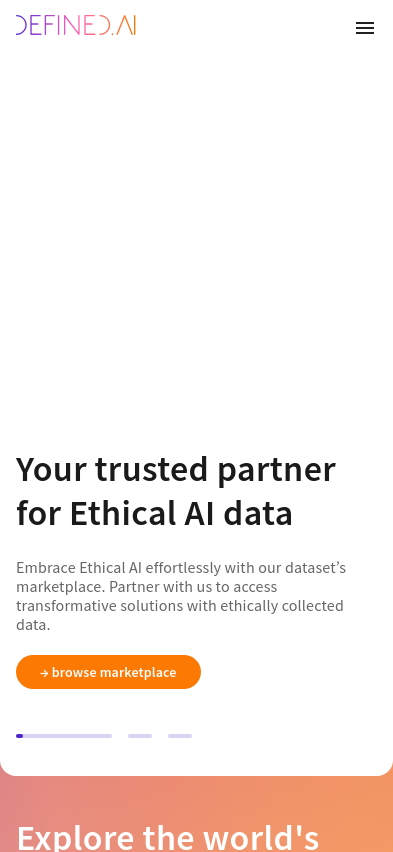
Defined AI is a marketplace for AI training data, streamlining data collection and annotation processes for AI model development.
Defined.ai is primarily focused on curating and providing ethically sourced datasets for Artificial Intelligence (AI) applications. Their key area of interest is in building an online marketplace that facilitates the buying and selling of AI data, tools, and models. This company emphasizes the importance of ethical AI, ensuring that the data used in AI development is collected, managed, and handled with the highest ethical standards—prioritizing privacy and transparency throughout their processes.
Unique Value Proposition and Strategic Advantage:
-
Extensive Dataset Offering: Defined.ai claims to host one of the largest marketplaces for training data, with a diverse range of datasets. This includes scripted monologues, spontaneous dialogues, Interactive Voice Response (IVR) dialogues, healthcare question and answer prompts, and medical image datasets, among others. This extensive offering allows them to cater to various sectors like banking, healthcare, and technology.
-
Ethical Sourcing and Transparency: The company sets itself apart by adhering to strict ethical guidelines in data collection and transparency, making it an attractive option for companies concerned with the ethics of AI training data.
-
Customizable and Off-the-Shelf Solutions: Defined.ai offers both standard and customizable data solutions tailored to the unique needs of different AI projects. This feature supports a wide array of applications, maximizing the utility of their datasets for customers.
-
Commitment to Quality: They emphasize rigorous quality control measures, ensuring that datasets are accurate and meet the high standards required for reliable AI outcomes.
-
Technological Expertise: The company boasts a team of experienced AI professionals who contribute to the development and evolution of their datasets, thereby maintaining cutting-edge relevance in AI innovations.
Delivering on Their Value Proposition:
-
Marketplace Browsing and Custom Services: Defined.ai's online marketplace supports easy access to a wide selection of datasets, accommodating a range of applications from multilingual speech recognition to content moderation. This marketplace is intended to provide off-the-shelf solutions as well as opportunities for custom-tailored data services.
-
Collaborative Expertise: Customers are invited to collaborate with Defined.ai's expert team, who are positioned as partners in driving AI projects towards success. The team uses its experience to refine, augment, and ensure the datasets' applicability to specific project needs.
-
High-Quality Standards: Dedicated quality control processes are implemented to continuously review and refine data for accuracy and reliability, aiming to deliver trustworthy data solutions that enhance AI project outcomes.
-
Community Engagement: Defined.ai places value on community interactions within the AI field to promote accessible and fair AI development.
The strategy blends comprehensive data solutions, stringent ethical practices, and a supportive professional services framework to position Defined.ai as a facilitator of responsible and effective AI innovations.
Viso.ai
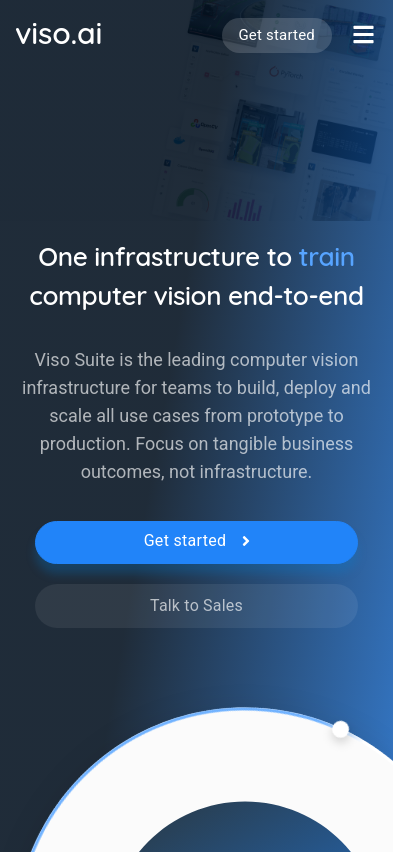
Viso.ai offers Viso Suite, an end-to-end platform for building, deploying, and scaling AI vision systems across industries like transportation, agriculture, and healthcare.
Viso.ai offers an end-to-end platform for developing, deploying, and managing computer vision applications. The platform, known as Viso Suite, provides a comprehensive solution for the entire AI lifecycle, enabling teams to build, deploy, and scale AI vision systems more efficiently. The main components and features of Viso Suite are outlined below:
Key Platform Features:
-
Data Management:
- Data Collection: Automate data gathering using integrated tools to collect high-quality training datasets from multiple sources.
- Data Annotation: Utilize tools for comprehensive image and video labeling, ensuring data remains secure within the user's environment.
-
AI Model Training:
- Support for importing pre-trained models or training custom AI models in modular environments.
- Continuous improvement and management of AI models are facilitated through an integrated model library and training manager.
-
Application Development:
- Construct computer vision applications using visual drag-and-drop tools and modular building blocks.
- Leverage a hardware-independent integration approach to future-proof applications.
-
Deployment and Management:
- Deploy applications at scale with device management systems that enable automated and secure device enrollment and management.
- Utilize edge computing to process data locally for fast, secure, and efficient operations without needing cloud resources.
-
Monitoring and Maintenance:
- Monitor applications in real-time with comprehensive analytics tools, enabling event monitoring and detailed data exploration.
- Ensure application stability and continuity through remote troubleshooting tools, system alerts, and automated health checks.
-
Security:
- Implement robust security measures such as edge protection and end-to-end encryption.
- Centralized access management to maintain user authorization and system authentication integrity.
Industry Applications and Use Cases:
Viso Suite caters to various industries, providing tailored computer vision solutions, such as:
- Transportation: Includes applications like pothole detection, automatic number plate recognition, and eye gaze detection for monitoring driver attentiveness.
- Agriculture: Features applications for livestock monitoring, intrusion detection, and productivity enhancement through AI-based monitoring.
- Manufacturing: Offers solutions for ergonomics risk analysis, object detection, and predictive maintenance of heavy machinery.
- Retail and Smart City: Automated self-checkout systems, crowd counting, and smart surveillance to improve customer service and operational efficiency.
Additional Information:
- No-Code Platform: Viso Suite emphasizes ease of use with no-code and low-code development environments, allowing users to create complex applications without extensive technical expertise.
- Privacy and Security: By using on-device processing, Viso Suite ensures data privacy and reduces the need to send sensitive information to external servers.
- Global Scale and Integration: The platform supports integration with various cameras and AI models, making it adaptable to a wide range of enterprise needs.
Viso.ai empowers organizations by providing a unified infrastructure that simplifies the deployment and scaling of AI vision applications across multiple sectors, focusing on achieving faster results and reducing operational costs. This comprehensive ecosystem fosters agility, enabling enterprises to automate visual data tasks effectively while maintaining high data security and privacy standards.
Deepset
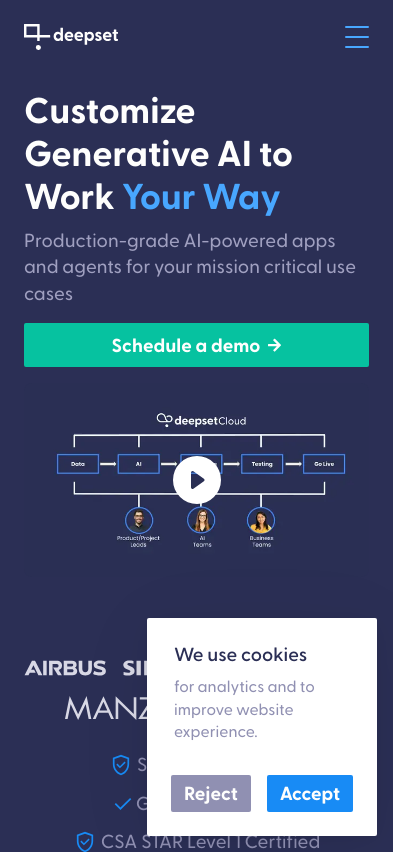
Deepset provides next-level semantic search capabilities for enterprises by leveraging latest NLP technologies and open-source.
Deepset provides an AI platform designed for enterprise AI teams, offering advanced solutions for implementing generative AI and NLP frameworks in business operations.
Key Features
-
deepset Cloud: A comprehensive SaaS platform that aids in the rapid development and deployment of custom AI applications using large language models (LLMs). It supports activities from prototyping to production, ensuring applications remain scalable and reliable.
-
Haystack Framework: This is an open-source NLP framework developed by deepset to support advanced AI needs like semantic search, question answering, and conversational AI.
Customization and Control
-
Flexible AI Solutions: Users can design tailor-made AI applications or select from existing templates to address specific business needs. The platform allows businesses to avoid vendor lock-in by exploring new models and configurations.
-
Model Optimization: Includes tools for prompt engineering, data pre-processing, and fine-tuning models in GPU notebooks, enhancing the performance of applications.
Deployment and Monitoring
-
Seamless Deployment: Users can deploy applications with a single click and monitor their performance using metrics like latency and groundedness. The infrastructure is designed to auto-scale, adjusting to changes in traffic.
-
Data Integration: Deepset Cloud allows for the integration of structured and unstructured data, optimizing AI models using existing data sources for improved speed and accuracy.
Security and Compliance
- Regulatory Compliance: The platform conforms to SOC 2, GDPR, and CSA STAR Level 1 requirements, ensuring data security and privacy.
Industry Applications
- Transformative Solutions: Deepset's tools are employed across various sectors including:
- Finance: Automates processes and uncovers insights from data troves.
- Insurance: Accelerates and streamlines operations.
- Legal: Offers AI-driven legal research solutions for efficiency.
- Media and Publishing: Enhances content discovery and user experience through personalized recommendations.
Resources and Opportunities
-
Educational Webinars and Guides: Deepset provides resources like webinars, reports, and industry guides to help businesses and developers keep abreast of AI trends and practices.
-
Partnership Encouragement: Deepset encourages partnerships to aid businesses in effectively integrating AI technologies into their workflows, reducing the time and cost involved compared to developing in-house infrastructure.
Case Studies and Success Examples
- Airbus: Implemented a QA system in their cockpit operations.
- Zeit Online: Utilized deepset Cloud for improved content recommendation.
- Manz: Leveraged semantic search to expedite legal research.
Vision for AI
- Deepset aims to bridge the gap between data science, software development, and executive teams to effectively implement AI-driven applications, focusing on practical, business-impacting use cases.
Deepset’s offerings emphasize flexibility, security, and efficiency in adopting AI technologies for enterprise applications, catering to diverse industries by providing tools for customized AI solutions and efficient data management.